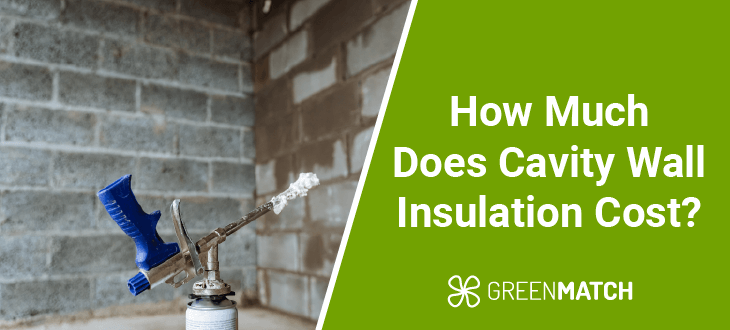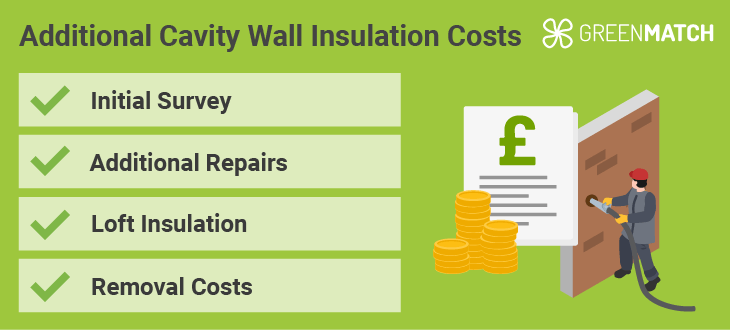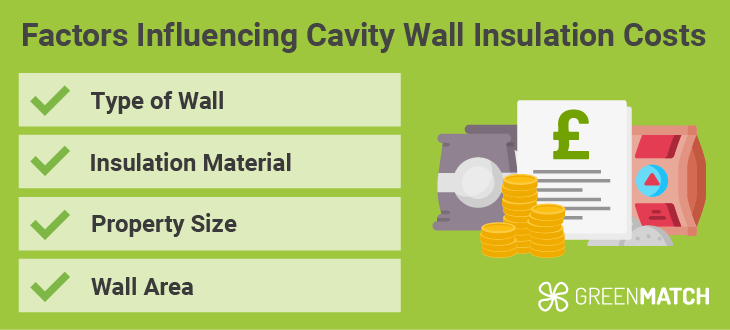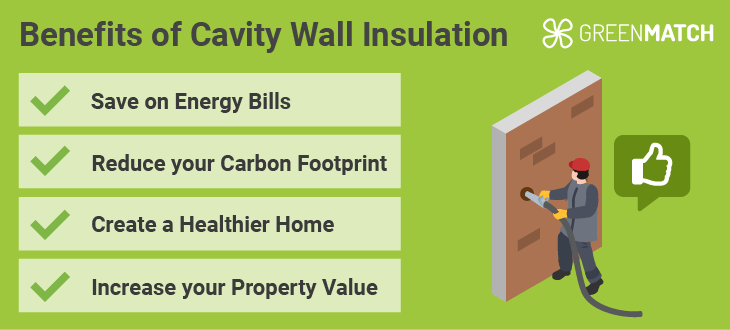Answer these simple questions and we will find you the BEST prices
Which type of solar quotes do you need?
It only takes 30 seconds
100% free with no obligation

Get Free quotes from insulation specialists near you

Save money by comparing quotes and choosing the most competitive offer

The service is 100% free and with no obligation
- GreenMatch
- Insulation
- Wall Insulation
- Cavity Wall Insulation
- Cavity Wall Insulation Costs
Cavity Wall Insulation Cost: Guide for 2025


- Nearly 75% of all properties in the UK have cavity walls.
- A detached UK home can expect to pay up to £4,600 for cavity wall insulation.
- Cavity wall insulation in a detached UK home can save £405 on annual energy bills.
Cavity wall insulation costs can sit between £1,000 - £4,600 depending on your property type and size, but can also bring you sky-high energy bill savings between £110 - £405 annually. In most cases, this means you can make the money back on your initial investment in just a short 10 years!
But why get cavity wall insulation? According to the Energy Saving Trust UK, up to 33% of all heat loss experienced in a home is through uninsulated walls. This leads to staggering energy bills, an uncomfortable living environment, and a carbon footprint that makes driving a car look eco-friendly.
That is why proper cavity wall insulation is worth every penny. It’s a simple, non-invasive insulation process that takes no more than 2 hours, saving you money, improving your living environment, and protecting the planet all with one investment. This complete guide by GreenMatch UK will delve into all the costs associated with cavity wall insulation, including cost-influencing factors, as well as the pros and cons to consider.
Ready to insulate your cavity walls? Look no further than GreenMatch UK for all the support you need. Through our nationwide network of accredited installers, we can deliver you up to 3 free home-tailored quotes at competitive prices. Simply spend 30 seconds filling out our online form, and let us handle the rest. Click below to begin!
- Describe your needs
- Get free quotes
- Choose the best offer
It only takes 30 seconds



- How much does cavity wall insulation cost in the UK?
- Cavity wall insulation cost per m2
- What are the factors that impact the cost of cavity wall insulation?
- Is cavity wall insulation worth it for your home?
- Government grants to help you with cavity wall insulation costs
- Obtain multiple quotes to get the best cavity wall insulation price
- FAQ
How much does cavity wall insulation cost in the UK?
Like most prospective buyers, you might be wondering; how much is cavity wall insulation? On average, proper cavity wall insulation can cost anywhere from £1,000 to £4,600, depending on your property type, size, chosen insulation material, and several other factors. The cost of cavity insulation in a 3-bed semi is approximately £2700.
Here’s a full cost breakdown of cavity wall insulation price averages per property type:
| Property type | Typical installation costs (£/year) |
|---|---|
| Flat/Apartment | £1000 |
| Mid-terrace home | £1500 |
| Detached bungalow | £2100 |
| Semi-detached home | £2700 |
| Detached home | £4600 |
It’s good to know that your investment can also differ greatly based on your chosen insulation material, covered later in the article. It’s best to work with a professional accredited insulation installer who can quote a home-tailored price that takes into account your circumstances.
Additional costs

In addition to the average costs of cavity wall insulation, several other expenses are part of the process. While some are case-specific, others are simply expected.
The sections below outline some other costs you can expect in the process of cavity wall insulation, as well as why they’re relevant.
Initial survey
Before beginning a cavity wall insulation project, a professional installer must conduct a property assessment to ensure your cavity walls are in proper shape. This survey can cost anywhere from £150 - £300, but most professional installers provide a free inspection if you choose their services for the installation.
The initial property survey looks for any wall issues or damage, existing insulation that might need removing, wires that need relocating, and many other preparatory works to know what your home needs.
Most installers will combine this cost with the rest of the installation package, but some even have a cavity wall insulation cost calculator on their site to give you a rough estimate.
Additional repairs
Sometimes, a property assessment might identify additional repair works needed before your cavity wall insulation. Exterior wall cracks and openings are a non-negotiable repair that must take place to ensure your cavity wall insulation works efficiently and isn't at risk of dampness.
Another common repair is related to wall ties, which cost around £30 - £50 per square metre to repair and replace. Wall ties are an important structural support found in cavity walls that secures the two wall leaves (internal and external) at a symmetrical width. Wall ties that have loosened over time will need replacing.
Loft insulation
Many insulation companies will provide combined packages for wall and loft insulation. Loft insulation alone can cost around £880 - £1,200 depending on your home type, but some combined packages might offer better bargains on both.
Loft insulation is important because - like walls - uninsulated lofts are responsible for almost one-third of heat loss experienced in a home. The combined insulation of both walls and loft can provide a massive cut to your home’s heat loss, carbon footprint, and energy bill savings.
Removal costs
If your home was built after the 1920s, chances are that it’s a cavity wall build. Older cavity wall homes might have existing insulation in place that is outdated and needs removing, which can cost roughly around £1,600 - £2,600 depending on your property size and removal complexity.
Generally, old insulation needs to be removed if it’s too compressed, damaged by moisture, mould, or infested with vermin. Nevertheless, some insulation companies may provide a combined package that carries out a full insulation replacement.
Cavity wall insulation cost per m2
The average cost of cavity wall insulation per m2 can range from £13 - £30 considering insulation material alone. The main three materials used in cavity wall insulation are mineral fibre, polystyrene beads, or spray foam, however, several other options are just as effective and worthwhile:
- Mineral fibre: Costing around £13 - £18 per m2, mineral fibre is one of the most popular, budget-friendly and sustainable options for cavity wall insulation found on the market. These are loose mineral (rock) fibres that are blown into the cavity space before being sealed, ensuring protection from moisture damage.
- Glass wool: Similar to mineral fibre, glass wool costs around £13 - £18 per m2 and is just as popular to produce. Like mineral fibre, both materials are generally made from recycled materials and can also be recycled at the end of their lifespan.
- Wool fibre: Despite costing a heftier £25 - £30 per m2, wool insulation is one of the most sustainable, hypoallergenic, and environmentally friendly cavity wall insulation options on the market. Made from treated sheep's wool, this material is entirely recyclable and exhibits impressive heat retention properties.
- Cavity wall boards: While unsuitable for older builds, newly built homes can make use of cavity wall boards - costing around £15 - £17 per m2 - before sealing up their cavity walls. These rigid boards can be made from various materials - such as PIR - and are renowned for being some of the best at heat retention.
- (EPS) Expanded polystyrene beads: Costing around £18 - £22 per m2, polystyrene beads have been rapidly rising in popularity as a formidable insulation choice. Being entirely moisture and mould-resistant, these beads are injected into the cavity space, where they expand to fill any gaps. Better yet, these beads are endlessly recyclable.
- Polyurethane foam: Cavity wall insulation foam - costing £22 - £26 per m2 - is an effective insulator that is injected as a liquid into the cavity space, where it expands to create an airtight seal. Unfortunately, polyurethane is a highly toxic, unrecyclable chemical component that can release harmful VOCs and off-gases throughout its lifetime.
Considering cavity wall insulation materials, mineral fibre insulation types tend to be the cheapest cavity wall insulation on the market, polyurethane foam is often the most effective at retaining heat, whereas polystyrene beads are the best mix between affordability, effectiveness and recyclability.
What are the factors that impact the cost of cavity wall insulation?

Several factors can influence the cost of a cavity wall insulation job. These tend to be matters such as your home type, size, chosen insulation material, and any other personal circumstances that an installer should consider with your home.
Type of wall
To accommodate cavity wall insulation, your cavity walls need to be in good condition, with any damage, openings or faulty brickwork solved before conducting a job. The cavity space in between the wall leaves must also be at least 50mm wide or more.
In standard industry practice, most cavity wall properties will have a cavity width of 100mm - 150 mm. Depending on the cavity space width, your material costs may be higher or lower.
A professional installer can conduct a property assessment to ensure your property meets the right conditions for the job or can guide you to what needs to be done first.
Insulation material
With the wide range of insulation materials available on the market, your choice of material will inevitably impact your final investment cost. As a general rule of thumb, materials that cost more are likely more effective at retaining heat, however, some sustainable options like sheep wool are worth the extra cost due to its added environmental friendliness.
On the cheaper end of the spectrum, options like mineral fibre are far more budget-friendly but are not as effective at retaining heat when compared to materials like polystyrene beads.
Property size and wall area
Your home type and size will also somewhat dictate your overall costs. Simply put, the more wall area you have, the more you will need to pay. However, installation complexity can play a role here too. Homes with simpler wall layouts may require simpler labour as opposed to complex floor plans.
This also means that some homes may need scaffolding in place, especially if they have home extensions such as orangeries or conservatories. Unfortunately, most cavity wall insulation companies do not account for coverage of scaffolding, which can cost somewhere around an extra £300ormore to hire.
Is cavity wall insulation worth it for your home?

Cavity wall insulation is one of the most effective and rewarding home upgrades anyone could implement. What might seem like a hefty initial cost, is worth every penny through the wealth of advantages, including financial savings, a well-maintained home environment, and a greener planet.
With all things considered, cavity wall insulation is an all-round home insulation essential that will save you money, improve your home environment, and benefit the environment, all with just one investment!
Lower energy bills
Homes with poor insulation end up with a heating system that overworks to compensate for lost heat. This racks up sky-high energy bills for your property.
Proper wall insulation can cut your heat loss by up to 33%, saving up to £405 in annual energy bill savings for a detached UK home. Additionally, cavity wall insulation is very cost-effective in terms of payback time on your investment, on average taking just 10 years to pay itself off
Here’s a full breakdown of expected savings with cavity wall insulation per home type:
| Property type | Energy bill savings (£/year) | Average payback period |
|---|---|---|
| Flat/Apartment | £110 | 10 years |
| Mid-terrace home | £140 | 10.5 years |
| Detached bungalow | £175 | 12 years |
| Semi-detached home | £235 | 11.5 years |
| Detached home | £405 | 11.5 years |
Better health and a more comfortable home
Uninsulated homes are a breeding ground for mould and rot, due to damp and drafty inner environments. Not only is this bad for your home's structural integrity, but can also harm your health through respiratory illnesses such as asthma.
Insulating your cavity walls also helps your home retain heat better, resulting in warmer, more comfortable winters and cooler summers.
Older homes may have outdated forms of insulation. An example is formaldehyde foam insulation, a spray foam that was very popular for insulation purposes in the 70s and 80s.
Similar to polyurethane, formaldehyde is a carcinogen and releases toxic gases that irritate the respiratory system, causing migraines and potential illness. Additionally, formaldehyde is highly flammable and completely un-recyclable.
Old insulation will need to be removed by a professional installer before new cavity wall insulation can be added.
Lower CO2 emissions
The UK housing stock is some of the least energy-efficient in all of Europe. According to the NHBC Foundation, UK housing is responsible for 30% of primary energy use, and 27% of the total carbon emissions in the country.
Cavity wall insulation can significantly reduce this heat loss, leading to an impressive 1.1 tonnes of annual CO2 reductions in detached homes.
Cavity wall insulation lasts long
Assuming a proper insulation job was carried out, cavity wall insulation can effectively last up to a century. That means after the first 10 years or so of paying off your investment, you can enjoy several decades of major savings before even considering a new insulation job.
Regardless, it's recommended to conduct a wall inspection during this time to proactively solve any damage to your home's exterior walls, helping to prolong the lifespan of your insulation. To learn more about how long does cavity wall insulation last and how to maintain it, you can read the article linked.
Provides some sound insulation
When compared to a cavity wall with an empty uninsulated cavity space, proper insulation will definitely help reduce noise pollution, however, heat insulation is not necessarily renowned for soundproofing qualities.
Some insulation materials, such as mineral fibre or spray foam are better at soundproofing than others, but for proper soundproofing of your home, there are other more effective measures to consider.
Increases property value
Homes that are properly insulated also have a higher EPC rating. An Energy Performance Certificate (EPC) rating tells you about your home's energy efficiency. Homes are scored on a scale of A (most efficient) to G (least efficient).
Should you ever plan to rent or sell, properties with higher EPC scores are valued much better on the housing market due to their better energy efficiency.
Government grants to help you with cavity wall insulation costs
If the costs of cavity wall insulation seem daunting to you, luckily the UK government has rolled out two key insulation grant schemes to help low-income and fuel-poor households with free insulation or partial cost coverage.
These are the Great British Insulation Scheme (GBIS) and the Energy Company Obligation (ECO4). Both schemes have similar eligibility criteria and are active until March 2026. Nevertheless, it’s best to apply earlier to maximise your chances of benefiting from a grant.
Additionally, many UK energy suppliers can give out grants and provide coverage of cavity wall insulation through themselves. Some examples are British Gas, EDF Energy, E.ON, Npower, SSE, Scottish Power and others.
Obtain multiple quotes to get the best cavity wall insulation price
Choosing to insulate your cavity walls is just the beginning of the journey. The next step is to make sure you work with a professional installer who ensures the job is done correctly. By looking at multiple cavity wall insulation quote prices, you can find your best fit.
A good way to do this is to look for PAS 2030-2035 certified installers. The Publicly Available Specifications (PAS) are a series of installer guidelines by the UK government that ensure insulation jobs are carried out to the highest standard. Another key certification is the Cavity Insulation Guarantee Agency (CIGA), which ensures that your cavity wall insulation job is guaranteed for up to 25 years. This way, you can ensure to get the best value for your money.
However, don’t just jump at the first offer you get! You might miss out on great cavity wall insulation prices by not researching and vetting installer options enough. Granted, this process can be very tedious and take endless hours of website surfing and phone call arranging, but that’s where GreenMatch UK can be your saving grace.
By simply filling out our 30-second online form, we can connect you with up to 3 free home-tailored insulation quotes from our nationwide network of trustworthy installers. That way, you can save time and money, sit back, and let the bargains come to you. The best part? Our services are completely cost and obligation-free. Click below to begin!
- Describe your needs
- Get free quotes
- Choose the best offer
It only takes 30 seconds



FAQ
Cavity wall insulation can cost around £1,000 – £4,600 depending on your property type and size. However, several factors can influence this overall cost such as your chosen insulation material, any existing insulation that needs removing, repairs, and installation complexity.
Cavity wall insulation removal can cost around £1,600 – £2,600 depending on your property type, size and removal complexity.
There are government grants in place to help with free and reduced-cost cavity wall insulation. These are the Great British Insulation Scheme (GBIS) and the Energy Company Obligation (ECO4). Both schemes are active until March 2026 and provide a range of home insulation measures, including cavity wall insulation.
Cavity wall insulation is a worthy investment with a wealth of benefits. By insulating your cavity walls, you can lower your energy bills by up to £405 in detached UK homes, as well as cut your carbon footprint by a staggering 1.1 tonnes. Additionally, cavity wall insulation can reduce your home heat loss by 33%.
The general price of cavity wall insulation per square metre can range from £13 – £30 depending on the insulation material you choose to work with. This cost does not include labour and installation costs, but just the material cost range.

Akif is a copywriter at GreenMatch since 2023. With a keen interest in community sustainability, green solutions and the role of digital media in identifying climate trends, he aims to hone in on his background in International Studies and Digital Media to provide a multidisciplinary approach to written content rooted in credible research and accuracy.
We strive to connect our customers with the right product and supplier. Would you like to be part of GreenMatch?

- Cavity Wall Insulation Cost: Guide for 2025
- How much does cavity wall insulation cost in the UK?
- Cavity wall insulation cost per m2
- What are the factors that impact the cost of cavity wall insulation?
- Is cavity wall insulation worth it for your home?
- Government grants to help you with cavity wall insulation costs
- Obtain multiple quotes to get the best cavity wall insulation price
- FAQ
